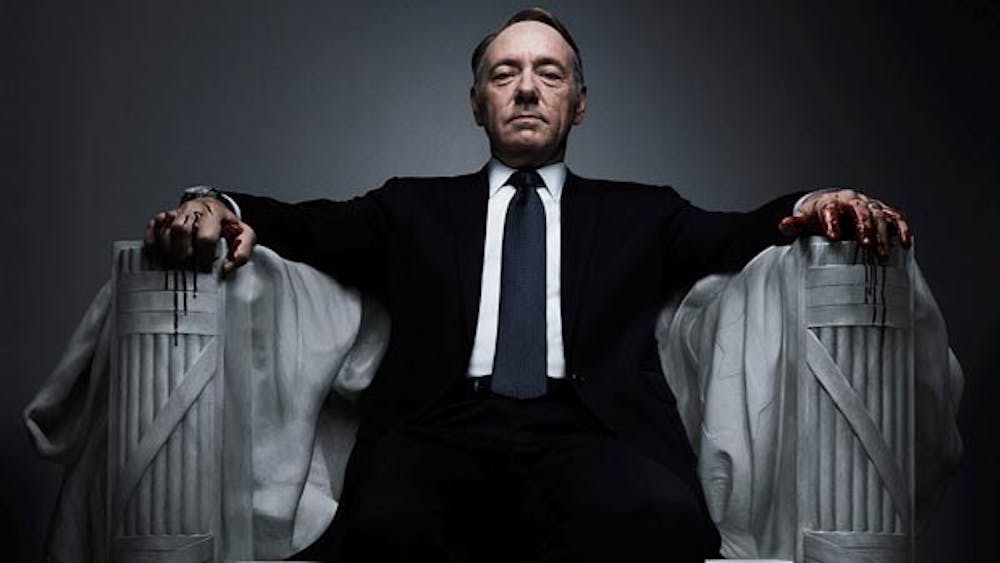Dark TV dramas play on fears, incite debate

House of Cards
This spring break, I admittedly did more than my fair share of Netflix binge-watching. I started slowly with HBO’s “True Detective,” then, hungry for more, proceeded to chew with rapid speed through both seasons of Netflix’s “House of Cards.”
This spring break, I admittedly did more than my fair share of Netflix binge-watching. I started slowly with HBO’s “True Detective,” then, hungry for more, proceeded to chew with rapid speed through both seasons of Netflix’s “House of Cards.” With time remaining before my family left for vacation and still not quite satiated, I washed down the last season of AMC’s “Mad Men” with a couple of Diet Cokes. I get it, I watch too much TV. Here’s the thing though — I got what I deserved. Those three days of constant screen time left me deeply, existentially depressed in a way I hadn’t experienced since I last attempted to read
Sartre’s Nausea.
Of course, these shows, featuring misanthropic antiheroes smashing through their plotlines in the most immoral fashion possible, don’t make for uplifting stories. Yet, I don’t typically feel this way after watching other morally abhorrent action movies or crude comedies. These dark dramas like “House of Cards,” “Mad Men” and “True Detective” are part of their own genre, and they are bothersome and powerful for the reasons most art is — because when we stare at them, we find ourselves staring back.
These shows and their antiheroes represent various personal and societal disintegrations we contemplate and fear. “House of Cards” is a playful exaggeration of what we suspect happens behind closed doors in Washington. In “Mad Men,” Draper’s inability to control his urges is what we fear will happen if we lose control, while also serving as a general metaphor for America’s “moral collapse” since the ’60s. Finally, Cohle in “True Detective” terrifies us with his rants on the true nature of reality and death. Whether the fears we have about self-control, the nature of reality or the leaders of our country are warranted is beside the point; what matters is that there is something we love about seeing our fears played out, watching our nightmares dance on the screen. These shows succeed because we internalize them. They attach to something inside of us and expand in the dark crevices of our minds.
So what do we take from this? First, I would intersperse some normal human interact......ion in with your binge-watching. More importantly, however, I realized that these shows are not to be watched mindlessly. They require engagement and beg us to connect their themes with thoughts and experiences from our own lives. The characters are supposed to get into your head. In short, once we understand that these shows are less like traditional television and more like good literature, we can cultivate a greater appreciation for what they have to offer and what they say about our human nature.
Once we accept the above concepts, watching and talking about TV can transform from a cultish, trivial activity to a cool, intellectual exercise. This is already happening to some extent, which is a cultural phenomenon in itself. Personally, it is a trend I would like to see continue since it makes art more accessible to the public. Therefore, I give you permission: Watch shamelessly.
More from The Rice Thresher

Andrew Thomas Huang puts visuals and identity to song
Houston is welcoming the Grammy-nominated figure behind the music videos of Björk and FKA twigs on June 27.

Live it up this summer with these Houston shows
Staying in Houston this summer and wondering how to make the most of your time? Fortunately, you're in luck, there's no shortage of amazing shows and performances happening around the city. From live music to ballet and everything in between, here are some events coming up this month and next!

Review: 'Adults' couldn’t have matured better
Sitcoms are back, and they’re actually funny. FX’s “Adults” is an original comedy following a friend group navigating New York and what it means to be an “actual adult.” From ever-mounting medical bills to chaotic dinner parties, the group attempts to tackle this new stage of life together, only to be met with varying levels of success.

Please note All comments are eligible for publication by The Rice Thresher.